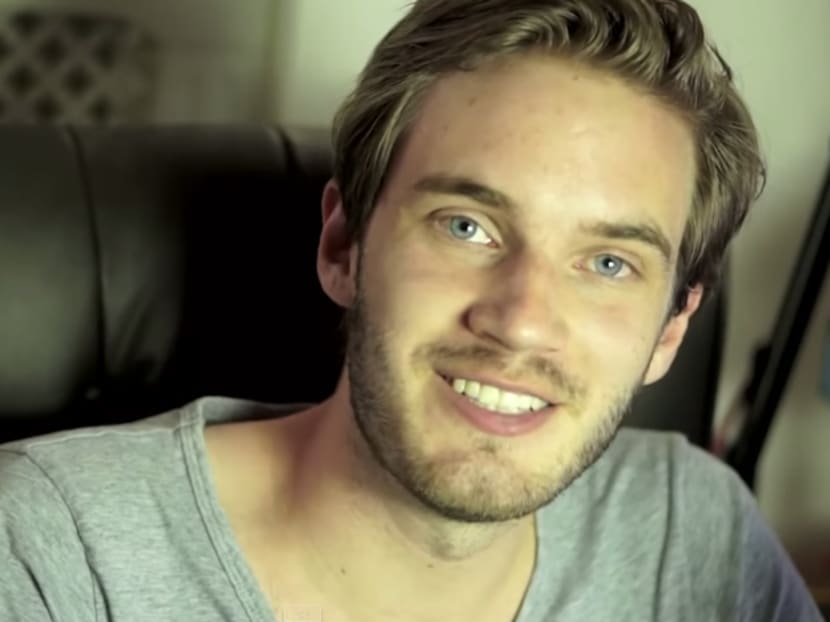Without big YouTube star, Google faces setback in content plans
LOS ANGELES/SAN FRANCISCO — In December, Felix Kjellberg threatened to take his star power off YouTube.

YouTube star Felix Kjellberg, also known as PewDiePie. Photo: PewDiePie/YouTube
LOS ANGELES/SAN FRANCISCO — In December, Felix Kjellberg threatened to take his star power off YouTube.
Turns out, it was a ruse. The Swede behind the PewDiePie character admitted in a video that he was trying to boost his YouTube fan numbers to more than 50 million. Irreverence like this has turned him into the biggest celebrity on YouTube and helped the Google site become the world’s largest online video service.
Until, late on Monday (Feb 13), it became a liability. Google said it was removing PewDiePie’s channel from its premium advertising service and cancelling his YouTube series after he published videos with anti-Semitic messages.
The controversy is a setback for YouTube’s strategy of promoting premium content that attracts top advertising rates, and its newer attempt to get viewers to pay for original TV shows and movies. Kjellberg’s series “Scare PewDiePie” was one of the shows on this subscription service, known as YouTube Red.
YouTube’s programming strategy is devoted to the young, aspiring filmmakers, video bloggers and sketch comedians that first used the site. Unlike Netflix and Amazon.com, which have spent billions of dollars on programming from professionals already working in the Hollywood system, YouTube has funded original shows from PewDiePie, Joey Graceffa and Rhett and Link.
These stars help YouTube stand out from the crowd, but are harder to control. They built large followings speaking their minds without the filter of a producer or the restraints of a traditional media company.
DROPPED BY MAKER
The antics of YouTube stars are subject to greater scrutiny since large media companies gobbled up many of YouTube’s biggest channels. PewDiePie’s freewheeling style didn’t sit well at Walt Disney, whose Maker Studios cut ties with Kjellberg earlier on Monday in response to the videos. The Wall Street Journal first reported on Disney’s move.
YouTube determined that some of Kjellberg’s videos, which included one where he paid for two men to unfurl a sign reading “Death to All Jews”, violated its standards for advertiser-friendly content. However, YouTube decided that the videos didn’t cross its threshold for hate speech, which specifies that content must be intended to incite violence.
So the company dropped Kjellberg from Google Preferred, its white-glove service for brand-safe ads, and cancelled the second season of his show for YouTube Red. It didn’t remove Kjellberg’s videos from its site, nor restrict him from the regular system that drives most YouTube ads. A YouTube spokeswoman declined to comment further on the decision.
‘ONE CREATOR’
For Google, the public rebuke of YouTube’s biggest star won’t materially affect advertising sales. YouTube sells most of its ad in bulk, not around particular channels. And PewDiePie, though popular, accounts for a tiny fraction of overall viewership on a video site where thousands of channels have millions of subscribers.
“It’s one creator,” said Mr Richard Greenfield, an analyst at BTIG. “YouTube is far, far stronger than any one creator.”
Still, the move may put other YouTube creators on notice.
While removing the offending videos from premium ad deals was warranted, YouTube may risk pushing away creators if its standards look too stringent, said Ms Jill Sherman, senior vice president at advertising agency DigitasLBi. “The second it feels policed or overly mandated, it starts to feel like prime-time television,” she said. “And that’s exactly what YouTube doesn’t want.”
Google doesn’t disclose YouTube revenue, but has said repeatedly that it is, along with mobile ads, a primary driver of growth. During the fourth quarter, Ms Ruth Porat, Chief Financial Officer of Google parent Alphabet, said YouTube was seeing “tremendous growth”.
She wouldn’t share how many paid subscribers YouTube Red has. “We’re pleased with the early success,” Ms Porat said. “It’s still early days. It takes a while to build a subscription business here.” BLOOMBERG





